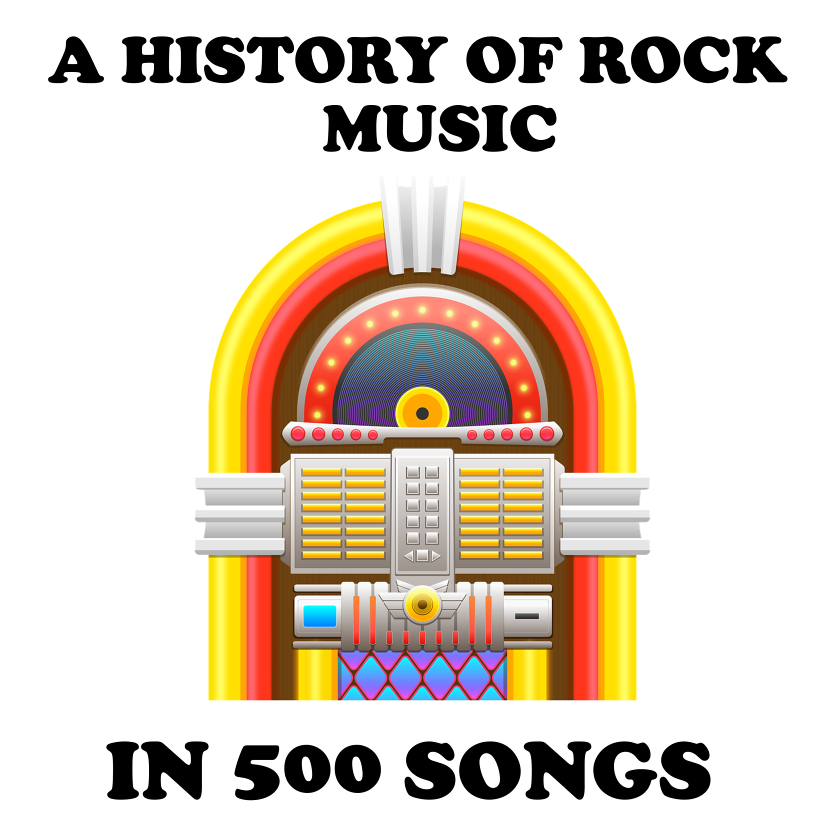This year I’ve listened to 519 podcasts and 36 of those were episodes of A History Of Rock Music in Five Hundred Songs.
But it’s safe to say that A History Of Rock Music in Five Hundred Songs is my favorite new podcast that I discovered this year and it deserves more attention and praise!

500 Songs
‘500 Songs’ is a mammoth project where Andrew Hickey sets out — over a period of ten years — to transcribe the history of rock music with one song per episode for a total of 500 songs. With 50 episodes per year, one per week, and the first year just wrapped.
Which 500 songs are on the list are not known, but it is not a popularity contest. Every song has to fit the narrative. It’s about the history and how everything is related and one thing is built on top of another. So he doesn’t just pick songs because they are popular. Which is not to say there are many episodes about well known songs.
I know nothing about Andrew Hickey, he is not a famous podcaster (yet!) or a celebrity turned podcaster. But I do know that there are very few people on the planet that know or care more about music than he does.
I’ve heard some people describe his monotone voice as off-putting (yes, I try to push this podcast a lot to people), but what I hear is someone who is ultimately knowledgeable and passionate about music history.
All episodes are also available as a transcript, I think he writes out episodes and reads them ‘on air’. And the first 50 episodes are bundled in a book. There will be more books, and I suspect because of their completeness they can all be added to the definite canon of rock ‘n roll music.
Information density
If you think you know or understand even a little bit about pop or rock music. Think again, because you don’t. Or, at least I’m speaking for myself here. I thought I knew a little bit, until I discovered this podcast.
The information density is absolutely mind boggling, and every episode I come away thinking: how does he know all this?! (Fortunately he also has a couple of delightful informative episodes answering that question). And it is just loaded with a kinds of fun and mind-blowing details:

There are a few general observations that return again and again through most of the early 50’s rock music scene. Here are a few that stand out:
- It seems like there is almost no original work in the early days. Every song is borrowed, stolen or riffed of something that was already well known and sometimes existed for decades. The concept of creating new or original music seemed to be novel. Just listen to the Hound Dog episode to get an idea of this. Everything is connected and grown out of something else (which is still the case nowadays, but more obvious and the norm back then). This goes for a lot of songs.
- How things came to be is almost always chaotic and messy and more often than you would think the result of serendipity. So there are very few straight lines to be drawn. Not only did people borrow or steal songs, they also have different versions of “the truth”. This is also what makes the podcast a mammoth undertaking. Try figuring out how certain records came to be 60 years after the fact.
- Some things stay hidden or unexplored but they just leave you thinking “excuse me?!”. Like this tidbit:

- Some of the music we still listen to were generation or genre defining songs. But to the creators they were sometimes nothing more than a quick way to make a buck. Music was (and is?) ethereal, and the concept that songs would still be played years and years later was not something most artists thought about. So there are many stories of artists selling the rights for a 100 dollars or so to a records that sold millions.
- The first 50 episodes focus mostly on the 1950s and there are some brilliant episodes. The Little Richard one is an absolute standout episode, so are the Elvis and Johnny Cash ones. Actually: from episode 33 to 39 is the best podcast streak I have ever heard. It’s a completely different time, so I am always amazed some of the folks discussed are still alive. E.g. Jerry Lee Lewis (The Killer) and Little Richard are still among us.
‘500 Songs’ is not only the story of rock music it is also a story of America coming off age. The story of cities swallowing up rural areas, of changing landscapes, of changing lives. And of radiowaves and records connecting a vast country and cementing something that we now know as ‘popular culture’.
It’s an absolutely wonderful and riveting story and you should give this podcast a listen!
Leave a Reply